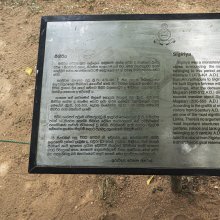Rajakiya, Rājakīya: 14 definitions
Introduction:
Rajakiya means something in Hinduism, Sanskrit, the history of ancient India, Marathi, Hindi. If you want to know the exact meaning, history, etymology or English translation of this term then check out the descriptions on this page. Add your comment or reference to a book if you want to contribute to this summary article.
Alternative spellings of this word include Rajkiy.
Images (photo gallery)
India history and geography
Source: Cologne Digital Sanskrit Dictionaries: Indian Epigraphical GlossaryRājakīya.—(LP), government tax. Cf. samasta-rājakīyānām = apraveśya (IE 8-5); same as Rāja-puruṣa or Rāja-sevaka; also Rāja-satka; an officer of the king. Note: rājakīya is defined in the “Indian epigraphical glossary” as it can be found on ancient inscriptions commonly written in Sanskrit, Prakrit or Dravidian languages.

The history of India traces the identification of countries, villages, towns and other regions of India, as well as mythology, zoology, royal dynasties, rulers, tribes, local festivities and traditions and regional languages. Ancient India enjoyed religious freedom and encourages the path of Dharma, a concept common to Buddhism, Hinduism, and Jainism.
Languages of India and abroad
Marathi-English dictionary
Source: DDSA: The Molesworth Marathi and English Dictionaryrājakīya (राजकीय).—a (S) Relating to a king, kingly, regal, royal.
Source: DDSA: The Aryabhusan school dictionary, Marathi-Englishrājakīya (राजकीय).—a Kingly, royal. Political.
Marathi is an Indo-European language having over 70 million native speakers people in (predominantly) Maharashtra India. Marathi, like many other Indo-Aryan languages, evolved from early forms of Prakrit, which itself is a subset of Sanskrit, one of the most ancient languages of the world.
Sanskrit dictionary
Source: DDSA: The practical Sanskrit-English dictionaryRājakīya (राजकीय).—a. Kingly, royal.
Source: Cologne Digital Sanskrit Dictionaries: Shabda-Sagara Sanskrit-English DictionaryRājakīya (राजकीय).—mfn.
(-yaḥ-yā-yaṃ) Royal, kingly E. rājan a king, ka substituted for the final, and cha aff.
Source: Cologne Digital Sanskrit Dictionaries: Benfey Sanskrit-English DictionaryRājakīya (राजकीय).—i. e. rājan + ka + īya, adj. Royal, [Lassen, Anthologia Sanskritica.] 13, 17; 31, 6.
Source: Cologne Digital Sanskrit Dictionaries: Cappeller Sanskrit-English DictionaryRājakīya (राजकीय).—[adjective] royal, princely.
Source: Cologne Digital Sanskrit Dictionaries: Monier-Williams Sanskrit-English Dictionary1) Rājakīya (राजकीय):—[from rāj] mfn. ([from] [preceding]) of or belonging to a king, princely, royal, [Rājataraṅgiṇī; Sāhitya-darpaṇa] etc.
2) [v.s. ...] m. ([scilicet] puruṣa) king’s servant, [Vetāla-pañcaviṃśatikā]
Source: Cologne Digital Sanskrit Dictionaries: Yates Sanskrit-English DictionaryRājakīya (राजकीय):—[(yaḥ-yā-yaṃ) a.] Royal.
Source: DDSA: Paia-sadda-mahannavo; a comprehensive Prakrit Hindi dictionary (S)Rājakīya (राजकीय) in the Sanskrit language is related to the Prakrit word: Rāikka.
[Sanskrit to German]
Sanskrit, also spelled संस्कृतम् (saṃskṛtam), is an ancient language of India commonly seen as the grandmother of the Indo-European language family (even English!). Closely allied with Prakrit and Pali, Sanskrit is more exhaustive in both grammar and terms and has the most extensive collection of literature in the world, greatly surpassing its sister-languages Greek and Latin.
Hindi dictionary
Source: DDSA: A practical Hindi-English dictionaryRājakīya (राजकीय) [Also spelled rajkiy]:—(a) royal; public, official; pertaining to the state.
...
Kannada-English dictionary
Source: Alar: Kannada-English corpusRājakīya (ರಾಜಕೀಯ):—
1) [adjective] of or concerned with government, the state or politics; political.
2) [adjective] engaged in or taking sides in politics; political.
3) [adjective] of or characteristic of political parties or politicians; political.
4) [adjective] partial; biased; prejudiced; unfair; bigoted.
--- OR ---
Rājakīya (ರಾಜಕೀಯ):—
1) [noun] = ರಾಜಕಾರಣ [rajakarana].
2) [noun] that which is relating to governance, ruling of a state or nation.
3) [noun] the act of meddling, interfering into another’s or otherś affair without being asked to; officiousness causing annoyance to others.
4) [noun] a secret, usu. evil, project or scheme; conspiracy; a plot.
Kannada is a Dravidian language (as opposed to the Indo-European language family) mainly spoken in the southwestern region of India.
See also (Relevant definitions)
Starts with: Rajakiya Vyavahara, Rajakiya-mana, Rajakiya-parishad, Rajakiya-prabhiyokta, Rajakiya-sabha, Rajakiya-satta, Rajakiyam, Rajakiyanaman, Rajakiyasaras.
Full-text: Rajakiyam, Rajakiyasaras, Rajakiyanaman, Rajakiya-mana, Rajakiya-satta, Raikka, Rajakiya Vyavahara, Samajika, Rajkiy, Rajasevaka, Rajapurusha, Rajamana, Bhattaraka.
Relevant text
Search found 1 books and stories containing Rajakiya, Rājakīya, Rājakiya; (plurals include: Rajakiyas, Rājakīyas, Rājakiyas). You can also click to the full overview containing English textual excerpts. Below are direct links for the most relevant articles:
Shukra Niti by Shukracharya (by Benoy Kumar Sarkar)
